| Srl | Item |
| 1 |
ID:
180242
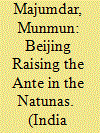

|
|
|
|
|
| Summary/Abstract |
China’s nine-dash line or U-shape line claim in the South China Sea overlaps with Indonesia’s 200 nautical miles exclusive economic zone (EEZ). There have been several instances where Jakarta and China have entered into skirmishes involving fishing vessels in the Natuna area. The latest encroachment by China into Indonesian Natuna EEZ witnessed a departure of China’s justification for such action when it argued that it has sovereignty over the Nansha (Spratly) Islands and also sovereign rights over relevant waters near the Nansha Islands. Jakarta rejected both the arguments and insisted that under United Nations Convention for the Law of the Sea (UNCLOS) China does not have legal basis to claim either traditional fishing grounds or parts of the Natuna waters and invoked the 2016 UN Arbitral Tribunal’s ruling to back its position. This article examines Indonesia’s response vis-à-vis China and argues that with the rise of nationalism over ownership of the Natunas it is likely to progress into an area of potential conflict between Indonesia and China.
|
|
|
|
|
|
|
|
|
|
|
|
|
|
|
|
| 2 |
ID:
180244
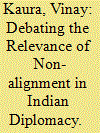

|
|
|
|
|
| Summary/Abstract |
The doctrine of non-alignment allowed India to remain aloof from the Cold War alliances while seeking to become a leader of the Non-Aligned Movement (NAM). The dominant view of scholarship on non-alignment is critical of India’s first prime minister, Jawahar Lal Nehru whose strategic adoption of the policy was converted into an ideology of anti-Americanism by his successors. Nehru has also been criticised for his pursuit of soft power without prioritising the acquisition of hard power. Since the end of the Cold War, Nehruvian ideas of non-alignment have been contested and replaced by neo-liberal perspectives.
|
|
|
|
|
|
|
|
|
|
|
|
|
|
|
|
| 3 |
ID:
180240


|
|
|
|
|
| Summary/Abstract |
The growth of economic corridors in developing regions has become instrumental in boosting economic growth and infrastructure. Economic corridors integrate existing road and rail networks to build effective multimodal transportation networks within a particular geographical setting with the aid of quality distribution networks, logistics and infrastructure. This helps in interlinking various markets and production centres of respective countries. This article investigates the influence of economic corridors in promoting sustainable as well as economic development in the South Asian region. The primary data for the article was collected using semi-structured questionnaires for local respondents and interviews that were conducted with key informants across South Asian region.
|
|
|
|
|
|
|
|
|
|
|
|
|
|
|
|
| 4 |
ID:
180238
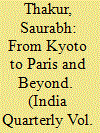

|
|
|
|
|
| Summary/Abstract |
Anthropogenic climate change has emerged as the most disruptive socio-political issue in the last few decades. The Kyoto Protocol’s failure to curb the rising greenhouse gases emissions pushed the UNFCCC-led negotiations towards a more flexible, non-binding agreement at the Paris COP21 meeting in 2015. The Paris Agreement’s hybrid approach to climate change governance, where flexible measures like the nationally determined commitments are balanced against the ambition of limiting the global temperature within the two-degree range, ensured the emergence of an increasingly complex and multi-stakeholder climate change regime. The article outlines the roadmap of the transition from the top-down approach of Kyoto Protocol to the legally non-binding, bottom-up approaches adopted for the post-Paris phase. The article outlines the post-Paris developments in international climate politics, which hold long-term geopolitical and geoeconomic implications. The article focuses on the fundamental shifts and balances within the UNFCCC architecture and examines the four fundamental features of this transition—the interpretation of differentiation and common but differentiated responsibilities, the evolving role of emerging economies in the negotiations, the rising profile of non-party stakeholders in shaping the climate action strategies and the emergence of climate justice movements as an alternate site of climate action.
|
|
|
|
|
|
|
|
|
|
|
|
|
|
|
|
| 5 |
ID:
180236
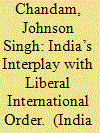

|
|
|
|
|
| Summary/Abstract |
India’s limited partnership with the liberal international order (LIO) of the post-Second World War period had seen a substantial transformation after the end of the Cold War through its economic integration with the world economy. At this critical time of liberal internationalism triggered by the relative decline of American hegemony, rise of the non-Western powers and the tendency of populism in the West, India’s role in the emerging order has been a fundamental imperative. The rationale for its comprehensive partnership with the liberal order rests on four main considerations: the looming threat to the liberal order and India’s role; consistency of India’s political principles with that of the liberal order; the concern for national interest, identity and global role; and finally, the absence of any viable alternative order. In spite of these promising values and necessities, India’s deeper integration has been constrained by three major factors. The first reason relates to the very concept of the LIO, which is slightly Western-oriented. The second reason corresponds to India’s core identity and its governing view with regards to the world—of non-alignment, sovereign autonomy, non-interference and civilisational identity. Finally, its maximum assimilation within the liberal order continues to be hindered by ‘domestic setbacks’.
|
|
|
|
|
|
|
|
|
|
|
|
|
|
|
|
| 6 |
ID:
180241


|
|
|
|
|
| Summary/Abstract |
In the last 70 years, due to reforms and policies, China has moved from an agrarian economy to being a manufacturing superpower. However, this has been possible due to technology transfers into China with the core technologies remaining with the West in the name of competitiveness and national security. To achieve true technological independence and self-reliance, China proposed the ‘Made in China 2025’ policy in 2015 which has since been opposed vehemently by the West. This notwithstanding, China has continued its effort of self-reliance. Hence, it is essential to evaluate if these efforts are bearing the required results.
|
|
|
|
|
|
|
|
|
|
|
|
|
|
|
|
| 7 |
ID:
180243
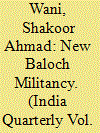

|
|
|
|
|
| Summary/Abstract |
Since the early 2000, Balochistan is yet again embroiled in a cobweb of violence after a hiatus of more than two decades. The Baloch nationalist militancy began to reinvigorate after the seizure of power by General Pervez Musharraf in 1999. Musharraf marginalised the moderate Baloch nationalists and repressed dissident voices. The differences over power and resource sharing escalated quickly into a full-blown armed struggle once Musharraf used indiscriminate force to subdue opposition against his regime. This article examines the proximate and long-term structural factors that led to the resurgence of armed militancy at the turn of the twenty-first century. It analyses the new drivers and dynamics of the present conflict that make it more virulent and lend it a distinctive character.
|
|
|
|
|
|
|
|
|
|
|
|
|
|
|
|
| 8 |
ID:
180237
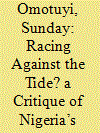

|
|
|
|
|
| Summary/Abstract |
The recent vigorous campaign by Nigerian government for a permanent membership of the United Nations Security Council is, like previous attempts, hinged on the country’s ‘track record’ in peacekeeping operations. However, in recent years, particularly since the uprising of the Boko Haram terrorist group, it appears that Nigeria’s commitment to this role has diminished considerably in its foreign policy priorities. This article, against this background, makes three arguments: First, it argues that Nigeria’s reluctance to keep faith with its peacekeeping mission is undermining the critical platform under which the quest for the seat is based. Second, notwithstanding the possession of the realist’s attributes of a regional leader, Nigeria’s poor image and dearth of soft power has created legitimacy crisis for it among regional states and beyond as none of its traditional allies in the Security Council has thrown its weight behind its bid. Finally, the study shows that the preponderance number of Nigerians does not subscribe to Nigeria’s bid in view of the security and socio-economic crises battling the country. Rather than dissipating energy on the quest, such effort should be channelled towards addressing the myriad domestic challenges threatening human security in the country.
|
|
|
|
|
|
|
|
|
|
|
|
|
|
|
|
| 9 |
ID:
180239


|
|
|
|
|
| Summary/Abstract |
This article seeks to examine how regional organisations in Africa are responding to the growing call for them to provide alternative approaches and models of economic development in the continent. The study interrogates the role of the African Development Bank (AfDB) as an agent of a changing global governance system and an emerging leader in Africa’s development journey. The article begins by reflecting on the debate of a decline in global governance; it looks at Africa within the global economy and examines the organisational structure, contributions and changing role of the AfDB since its inception. It concludes that the AfDB finds itself in a unique position of trust among donors and African states at a time when traditional institutions are becoming less popular. It recommends AfDB adopt a number of reforms needed to help it maximise its impact on the continent.
|
|
|
|
|
|
|
|
|
|
|
|
|
|
|
|